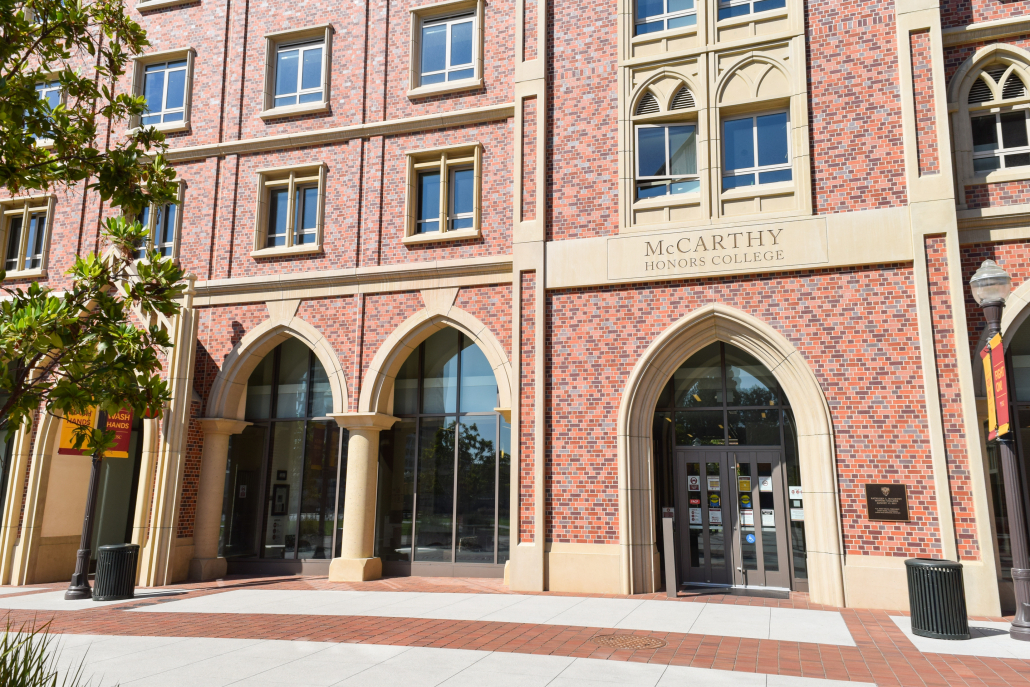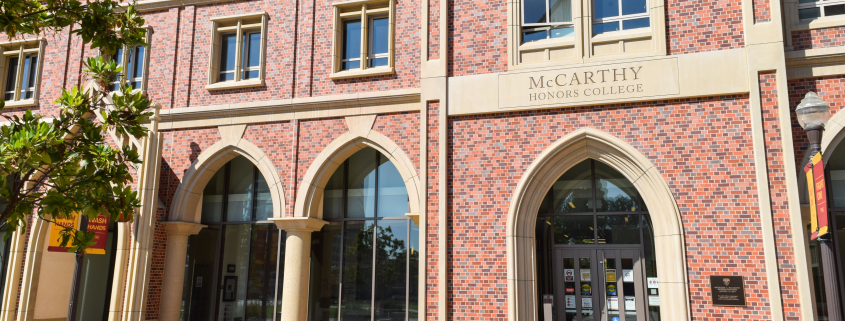RAs fear retaliation, firings after strike

Residential Education Student Affairs officials threatened punishment including probation and firing against resident assistants if they failed to report to shifts during the resident assistant strike, according to images posted on the @uscraorganizingcommittee Instagram and emails obtained by the Daily Trojan.
Disciplinary action against RAs typically takes the form of a three-strike policy, where missing a shift without calling in at least 48 hours prior amounts to a single strike, according to emails sent to RAs who called in to strike. Despite this policy, RA team leaders received information the night of the strike that striking for that night alone could lead to termination.
“[The document] basically also shared that if we went to the media, basically, as an RA of USC, and speaking directly from that role, that that can also be counted as a strike against us,” a McCarthy RA who requested anonymity due to the threat of disciplinary action said. “They had the possibility not only to not rehire us but to terminate our position.”
The McCarthy team decided not to uniformly strike due to fear of termination stemming from the threats, leaving RAs to decide whether or not to strike individually.
“I was still very worried about ResEd retaliating against us,” the RA said. “I didn’t know if it was fair for [them] to get punished out of the entire team.”
According to the RA, the threats by ResEd deepened the rift between those who are affected by the financial aid changes and those who are not, and are therefore more hesitant to strike.
“They weren’t so much encouraging us to work together,” they said. “They basically destroyed all that by how they responded to the strike.”
According to the RAs’ November petition and prior interviews with the Daily Trojan, when RAs received their financial aid packages before the fall semester, some realized it was smaller than it had been in the past, causing them to lose money while working long hours. Financial Aid registered RAs’ housing as free and removed it from the cost of attendance, resulting in a lower amount of gift aid despite no changes in some RAs’ financial situations. The petition demanded RAs are paid a stipend equivalent to room and board instead of deducting housing costs, removing the need to alter financial aid.
The USC RA Organizing Committee announced plans late November for an indefinite strike to start Dec. 3, demanding the financial aid office “fix [their] financial aid.”
A second McCarthy RA said they were warned about these alterations by other low-income students before they took on the job.
“It might just mess up your financial aid,” the second RA said. “You can just get the same amount of financial aid and work an actual job that will pay you.”
When the second RA began to raise gift aid concerns with residence coordinator Sally Belpoornia and senior director of ResEd Grant Burlew, they were told the role was a “personal decision” rather than a job, emphasizing a passion for their work rather than compensation. This definition is at odds with the long hours and effort the role requires, the second RA said.
“It’s like customer service. You need patience for this, it’s not something that you do for fun,” the second RA said. “The fact that it’s framed that way is a particular aspect of the RA position.”
The Financial Aid Office and ResEd held a town hall in the week following the strike, where representatives of both offices listened to RAs’ concerns and put them in contact with financial aid officials. The end result was frustrating, the second RA said.
“From the town hall, I can see that there wasn’t a lot of communication between them,” they said. “They didn’t know that there’s a difference between the apartment RAs and the freshman RAs because the difference is our meal plans.”
Students living in the typical USC dorm require a $6,630 meal plan as part of their residence, whereas those living in USC apartments have a smaller $4,520 meal plan.
Financial Aid also awarded an additional one-time payment of $500 to RAs for “recognition for the increased stress in the overall student body due to COVID-19,” according to a December email from interim Vice President of Student Affairs Monique Allard to RAs obtained by the Daily Trojan. The Financial Aid Office emailed RAs that the payments will be disbursed some time in Spring 2022. Addressing some of the grievances raised at the town hall, the email also announced a cost of attendance update adjustment for RAs to reflect the differences in meal plans between those living in dorms and apartments.
“They didn’t necessarily intend for it to be hush money, but it definitely came across that way,” a third McCarthy RA said. “They felt like everyone was pissed off at them.”
The email also said that USC will change its policy regarding the “minimum student contribution” component — equivalent to the average income of a full time student — in the financial aid package for RAs, which will now cover the contribution in addition to a gift aid amount based on need. This can act as compensation for RAs with demonstrated need, rather than just taking out housing costs.
In a statement to the Daily Trojan, ResEd wrote that the University is committed to “examine” the RA role at USC and that the RA Advisory Board will meet to “help with this process.” They also announced a survey “sent out by Campus Wellbeing that will look at RA well-being.”
The third RA said they were “saddened” because several people decided not to reapply for the role after December, citing the positive experience they personally had.
“Despite all this communication issues, it’s still been really, definitely worth it for me,” they said. “Besides the compensation part of it, being able to connect with my residents and actually help people is the reason I did it.”

